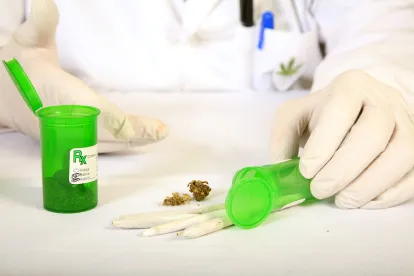We have written before about the virtual dead end faced by marijuana companies who try to seek protection in the bankruptcy courts. Almost uniformly, bankruptcy courts have shut their doors on marijuana companies, including their landlords and suppliers. These courts have held that although marijuana use may be legal in a majority of the States, it is still illegal under the federal Controlled Substances Act, and the bankruptcy courts cannot provide relief to debtors who are violating federal law.
These prior cases dealt with debtors whose income was, in whole or in part, derived from legal marijuana businesses. But, what about an individual who uses some of his or her income to legally purchase marijuana and who also needs bankruptcy protection? Are the bankruptcy courts off limits to those individuals as well? Recently, a bankruptcy court in Colorado addressed whether the cost of medical marijuana can be deducted from an individual debtor’s monthly disposable income for plan distribution purposes. Unfortunately for individuals who both use medical marijuana and who need to file bankruptcy, the court’s answer was a succinct “no”.
In In re Andrick, the debtors were a husband and wife who filed bankruptcy petitions under Chapter 13 of the Bankruptcy Code. Chapter 13 allows individuals with regular income to propose a plan to repay all or a part of their debts. As part of the Chapter 13 process, the debtors had to disclose both their current monthly income and a calculation of their disposable income. In their disposable income calculations, the debtors disclosed that they spent $900 per month on medical marijuana. Claiming a special circumstances deduction for the medical marijuana, the debtors’ plan provided for a distribution to unsecured creditors of approximately 38%. If the deduction for medical marijuana was backed-out, meaning that the $900 would be counted as disposable income that could be distributed to creditors, unsecured creditors would receive close to a 100% distribution under the plan.
The Office of the United States Trustee objected to the debtors’ plan, arguing in relevant part, that even though medical marijuana is legal in Colorado, the purchase of medical marijuana violated federal law, and that the proposed plan improperly requires the court to authorize the use of post-petition income for the purchase of illegal drugs. According to the U.S. Trustee, because the proposed plan fails to provide for payment of “all disposable income”, the plan cannot be confirmed.
The debtors’ response was long on empathy but short on legal argument. The debtors argued that the wife “suffers from a chronic and severely painful medical condition for which marijuana is the only effective remedy” and that she only uses marijuana for pain control and not for recreation. The debtors argued that because medical marijuana is legal in Colorado and the wife holds a valid license to use medical marijuana, the claimed special circumstances is permissible.
The bankruptcy court rejected the debtors’ argument. Citing to U.S. Supreme Court precedent, the court rejected the argument that marijuana use for medical purposes creates an exception to the application of the Controlled Substances Act. Without any such exception, the debtors’ use of medical marijuana, though legal under Colorado law, remains illegal under federal law, and therefore the “deduction of a medical marijuana expense cannot be allowed as either an ongoing out-of-pocket medical expense or as a deduction for special circumstances.” Because the debtors’ plan did not contribute all of their projected disposable income, the court denied confirmation of the debtors’ plan.
The court’s holding in Andrick was not surprising and is consistent with other courts that have dismissed cases, or rejected plans, filed by debtors whose incomes came, in whole or in part, from legal marijuana businesses. However, what is troubling about Andrick is the predicament the court’s holding creates for people who need bankruptcy protection but who also need to use medical marijuana. Many financially strapped individuals have too much income to qualify for Chapter 7, and are forced to file under Chapter 13. Under Chapter 13, these debtors need to pay all disposable income to their creditors for the duration of the plan. Without having the ability to deduct the cost of medical marijuana from their disposable income, these debtors will likely be unable to afford what to many is a legitimate medical product. It becomes an untenable choice – do I file bankruptcy to get relief from my creditors and obtain a fresh start, or do I continue being able to purchase medical marijuana? This could lead individuals to forsake bankruptcy relief for the relief afforded by medical marijuana.




 />i
/>i

